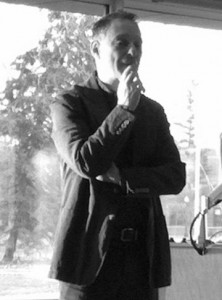This week, Grinnell College hosted its first ever Festival of the Humanities. The festival featured two speakers, Richard Handler, who runs the Global Development Studies program at University of Virginia, and Harrell Fletcher, a prolific artist. Students also gave presentations on their humanities work.

The Humanities Center has been preparing for the festival since last fall. It was billed as a way to reflect on the values of our institution as a liberal arts college and to emphasize the necessity of the humanities. It opened up a public space in which to debate the humanities’ role in higher education, and the value of a liberal arts degree.
“[The benefits of studying the humanities include] critical thinking and analytic skills, ethical thinking, engagement with difference in the world, values of citizenship, strong communication skills, the value of social engagement [and] ideas that engage with the diversity of human experience, values, and thought,” said Shuchi Kapila, English and Director of the Center for Humanities.
On Tuesday, Handler gave a lecture about his experience in organizing an interdisciplinary program at the University of Virginia, and the relationship between off-campus study, service abroad and “the identity of our students as privileged Americans.” He described how the departmental divisions of modern universities arose from the organization of 19th- and 20th-century Western Universities, but emphasized the need to approach development problems with critical, analytical thinking and through a humanist lens.
On Wednesday, Fletcher spoke about making art a social practice rather than an isolated form of expression. He also conducted a workshop called “Art and Social Practice” on Thursday. Fletcher has extensive experience with art as social practice, as he has produced many socially engaged, collaborative and interdisciplinary projects. His work has appeared at the San Francisco Museum of Modern Art, the de Young Museum, the Berkeley Art Museum, the Wattis Institute and Yerba Buena Center for the Arts in the San Francisco Bay Area, among others.
The student panels included presentations of excellence in research and scholarship, with such titles as “Deciphering the Source,” “Culture and Hybridity,” “Telling Stories, Making Music,” “Drawing Now, Three Propositions,” and “Crossing Borders, Queering Film.”
The Humanities Center selected students in December and January; those selected then went through an extensive workshop with Janet Carl, acting Director of the Writing Lab, on oral presentation skills. Katherine Ferraro ’12, presented a section of her summer MAP, which focused on a French translation of Shakespeare’s Macbeth. Comparing Shakespeare’s Macbeth to its source text, Holinshed’s Chronicles, she analyzed how this literary development reflects ideas of power.
Kapila emphasized the Festival’s role in highlighting the Humanities Center’s unique importance.
“We think it is important to have these debates [about the place of humanities in education], to talk across disciplines, and in a year of strategic planning really think about our values as a liberal arts institution,” Kapila said.
Ferraro echoed those sentiments on a different level.
“The humanities are important, because the skills that you improve upon in those courses—writing, close reading, critical discussion—are so applicable to our other courses here at Grinnell, and then afterwards in our professional lives,” Ferraro said. “I also think that the humanities are important because they answer the question asked of hard facts, ‘so what?’ So what if our hearts beat 72 times each minute? I think that the answer to ‘So what?’ can be found in the humanities.”




























































